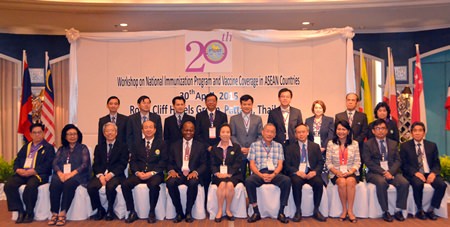The World Health Organization and four Thai medical institutions met to discuss local research into infectious diseases in hopes of better controlling outbreaks in Southeast Asia.
Usa Thisyakorn, president of the Pediatric Infectious Disease Society of Thailand, chaired the group’s 19th annual meeting at the Royal Cliff Hotel April 30. The meeting was organized by the WHO with Queen Saovabha Memorial Institute, the Thai Red Cross Society; the Department of Disease Control at the Ministry of Public Health; and the Faculty of Tropical Medicine at Mahidol University.
With the start of the ASEAN Economic Community later this year, medical academics are concerned about the wider spread of infectious diseases and outbreak of new diseases.
 Members of the World Health Organization and four Thai medical institutions met to discuss local research into infectious diseases.
Members of the World Health Organization and four Thai medical institutions met to discuss local research into infectious diseases.
Concerned with pediatric infectious diseases, the PIDST representatives from the 10 Association of Southeast Asian Nations countries to focus on vaccination issues in the ASEAN region, including Dr. Jean-Marie Okwo-Bele, the WHO’s vaccination expert, who lectured on the “Vaccines for All Ages”.
Usa Thisyakorn explained that the incidence of disease is inter-connected at the regional and global levels by virus strains, population, migration of people and immunity levels. Therefore, effective disease control and prevention are crucial and require that knowledge be shared among doctors and medical academicians.
Exhibited at the workshop were 12 pieces of Thai medical research, including “The Rabies-Free World” by Dr. Wongwat Liulak, director of the Disease Control Department in Bangkok. The department participates in the WHO’s One Health Project, which works to achieve harmony between humans and animals with a goal of wiping out rabies by 2020.
Of note in the research was that doctors have found that a single booster shot is more effective for post-exposure rabies prevention.
Usa said diagnosis and treatment of dengue fever in Thailand currently meets international standards. Although the prompt diagnosis and treatment helps decrease the mortality rate, the country needs effective measures to control and prevent the disease, he said.
Terapong Tantawichien of the Division of Infectious Diseases at Chulalongkorn University’s medical school presented his work at the meeting for the first time. In addition, the audience had a chance to learn from other researchers.
Of particular concern to many is dengue fever and the work being done to develop a vaccine.
In the “National Immunization Program and Vaccine Coverage Rates in ASEAN Countries” workshop, Thai medical researchers revealed that dengue fever is still a problem for both children and adults.
Usa said dengue fever is considered a global issue. WHO is finding increasing numbers of patients in Asia and South America every year, 75 percent of cases occurring in Asia.
Usa said that a vaccine for dengue is currently unavailable in the marketplace, but is in development.
“With the upcoming AEC, we need to learn how to better prevent diseases,” Usa said. “Otherwise, we will face difficulties from the spread of disease and the re-emergence of diseases thought to have been eradicated.”




